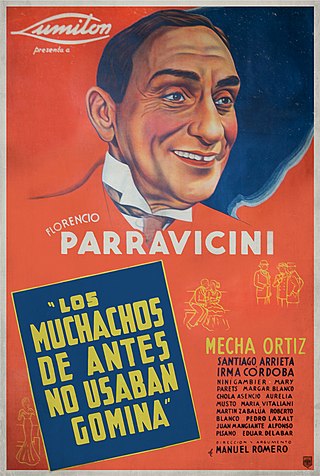The Boys Didn't Wear Hair Gel Before may refer to:
- The Boys Didn't Wear Hair Gel Before (1937 film), an Argentine historical drama film
- The Boys Didn't Wear Hair Gel Before (1969 film), an Argentine drama film
The Boys Didn't Wear Hair Gel Before may refer to:

Hilary Ann Swank is an American actress and film producer. She first became known in 1992 for her role on the television series Camp Wilder and made her film debut with a minor role in Buffy the Vampire Slayer (1992). She then had her breakthrough for starring as Julie Pierce in The Next Karate Kid (1994), the fourth installment of The Karate Kid franchise, and as Carly Reynolds on the eighth season of Beverly Hills, 90210 (1997–1998).

Brylcreem is a British brand of hair styling products for men. The first Brylcreem product was a hair cream created in 1928 by County Chemicals at the Chemico Works in Bradford Street, Birmingham, England, and is the flagship product of the brand. The cream is an emulsion of water and mineral oil stabilised with beeswax. It is notable for the high shine it provides, which spawned the name of the product, stemming from "brilliantine" and "cream".

Francisco Múgica was an Argentine film director, film editor and cinematographer. He was born and died in Buenos Aires.

Pierre Bruno Hugo Fontana, otherwise known as Hugo del Carril, was an Argentine film actor, film director and tango singer of the classic era.

Manuel Romeo was an Argentine film director, screenwriter, dramatist and score composer, and one of the influential directors in the cinema of Argentina of the classic era. He directed and wrote over 50 films between 1931 and 1951 even composing the musical scores for several.

The Boys Didn't Wear Hair Gel Before is a 1937 Argentine historical drama film directed and written by Manuel Romero and starring Florencio Parravicini, Mecha Ortiz and Santiago Arrieta.
The Boys Didn't Wear Hair Gel Before is a 1969 Argentine drama film. It is a remake of the 1937 film The Boys Didn't Wear Hair Gel Before, one of the biggest hits of the Golden Age of Argentine Cinema.
Irma Córdoba was an Argentine film actress of the classic era.

Frosted tips refers to a hairstyle in which the hair is cut short and formed into short spikes with hair gel or hair spray. The hair is bleached such that the tips of each spike will be pale blond, usually in contrast to the wearer's main hair color.
Los muchachos de antes no usaban gomina may refer to:
In Malaysia, school uniforms are compulsory for all students who attend public schools. School uniforms are almost universal in the public and private school systems. Western-style school uniforms were first introduced to Malaysia in the 19th century. Since 1970, uniforms have been made compulsory for all students throughout the whole country.

Homero Cárpena was an Argentine film actor born in Mar del Plata. He appeared in 72 films between 1933 and 1972 although the bulk of his work was in the late 1930s and 1940s. He starred in El hombre señalado, which was entered into the 7th Berlin International Film Festival. He was the father of actresses Claudia Cárpena and Nora Cárpena.

Carlos Enríquez (1898–1971) was an Uruguayan-born actor who worked primarily in Argentina. He starred in the 1950 film Arroz con leche, under director Carlos Schlieper.

Malisa Zini was an Argentine actress. She starred in the 1950 film Arroz con leche, among others such as Cumbres de hidalguía, under director Carlos Schlieper. s

Pedro Ascarateil Laxalt was an Argentine actor of Basque descent from Montevideo. He starred in the 1950 film Campeón a la fuerza.

Osvaldo Isaías Mathon Miranda was an Argentine film and television actor whose credits also included more than fifty stage productions.
Mary Parets was an Argentine actress. In 1943 she starred in Benito Perojo's Stella. Other notable films include The Boys Didn't Wear Hair Gel Before (1937), Ambición (1939) and Los pagares de Mendieta (1939).
Santiago Arrieta was a Uruguayan film actor, also known as Santiago Donadío. After emigrating to Argentina, Arrieta appeared in 26 films between 1935 and 1962.

Amalia Bernabé (1895–1983) was an Argentine stage and film actress. She appeared in around fifty films during her screen career which stretched from the Golden Age of Argentine Cinema to the 1980s.
Café de Hansen, Antiguo Hansen, Lo de Hansen, Restaurant del Parque 3 de Febrero or Tarana was a café in Buenos Aires, Argentina, and was one of the birthplaces of tango. Because of its monumental impact on the development and dissemination of the music, Café Hansen is often referenced in some of the most popular tango songs in Argentina.